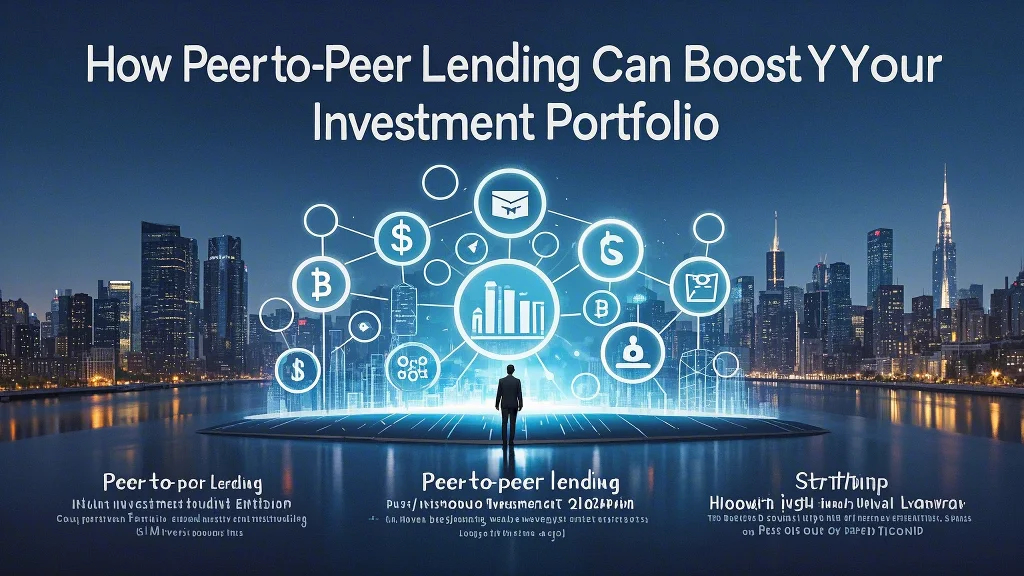Understanding the Potential of Peer-to-Peer Lending
In the evolving landscape of investment opportunities, peer-to-peer lending has emerged as a compelling option for investors seeking to diversify their portfolios. This innovative approach connects borrowers directly with investors through online platforms, bypassing traditional financial institutions. The best peer-to-peer lending platforms offer transparent information about borrowers, clear investment terms, and professional risk assessment tools.
One of the key advantages of peer-to-peer lending is its potential to generate higher returns compared to traditional fixed-income investments. Many platforms offer annual returns that significantly exceed those of savings accounts or government bonds. Additionally, the ability to spread investments across multiple loans helps mitigate risk through diversification. However, it’s crucial to understand that peer-to-peer lending carries higher risks, including the potential for borrower default and platform insolvency.
Exploring High Risk High Reward Investments
For investors with a higher risk tolerance, high risk high reward investments like peer-to-peer lending can offer exciting opportunities. These investments typically promise higher potential returns but come with increased uncertainty and volatility. The best high-risk investments often require thorough research, careful risk management, and a long-term perspective.
One of the most valuable aspects of high-risk investments is their potential to significantly enhance portfolio returns when successful. Many investors allocate a small portion of their portfolio to these opportunities while maintaining a core of more conservative investments. Additionally, the growing availability of alternative investment platforms has made it easier for individual investors to access these opportunities. However, it’s essential to approach these investments with caution and only commit capital that one can afford to lose.
Navigating Alternative Investment Platforms
The rise of alternative investment platforms has revolutionized how investors access non-traditional investment opportunities. These platforms offer a wide range of options, from real estate crowdfunding to private equity investments. The best alternative investment platforms provide user-friendly interfaces, comprehensive educational resources, and robust security measures.
One of the key advantages of using alternative investment platforms is the ability to access opportunities that were previously reserved for institutional investors or high-net-worth individuals. Many platforms offer low minimum investment amounts, making it possible for retail investors to build diversified portfolios. Additionally, the transparency and ease of use of these platforms have democratized access to alternative investments. However, it’s crucial to carefully evaluate the platform’s track record, fee structure, and regulatory compliance before investing.
Understanding the Role of Cryptocurrency Investment
In the broader context of alternative investments, cryptocurrency investment has emerged as a high-risk, high-reward option for tech-savvy investors. This digital asset class includes various cryptocurrencies and blockchain-based projects. The best cryptocurrency investments often come from a deep understanding of blockchain technology and careful evaluation of project fundamentals.
One of the key advantages of cryptocurrency investment is its potential for significant price appreciation in a relatively short period. Many cryptocurrencies have shown explosive growth, attracting both institutional and retail investors. Additionally, the decentralized nature of cryptocurrencies offers potential protection against inflation and government interference. However, it’s important to understand the extreme volatility and regulatory uncertainty associated with this asset class.
Exploring the World of Investing in Startups
For investors seeking potentially high returns, investing in startups offers exciting opportunities, though with substantial risk. This type of investment allows individuals to participate in the growth of innovative companies at an early stage. The best startup investments often come from thorough research, understanding of the industry, and careful evaluation of the founding team and business model.
One of the key advantages of startup investing is the potential for outsized returns if the company succeeds. However, it’s important to recognize that many startups fail, making diversification crucial in this asset class. Many investors choose to spread their investments across multiple startups to mitigate risk. Additionally, the rise of equity crowdfunding platforms has made it easier for individual investors to participate in startup investing, though it’s essential to approach these opportunities with caution and thorough due diligence.
Building a Comprehensive Alternative Investment Strategy
Creating a successful alternative investment strategy requires careful consideration of various factors, including risk tolerance, investment horizon, and overall portfolio objectives. It’s important to approach alternative investments as part of a broader investment strategy rather than in isolation. Regular reviews and adjustments to the alternative investment allocation are essential for staying aligned with changing market conditions and personal financial goals.
Another important aspect of alternative investing is staying informed about new opportunities and evolving market trends. The alternative investment landscape is constantly changing, with new asset classes and investment structures emerging regularly. By staying educated and working with knowledgeable professionals, investors can make more informed decisions about incorporating alternative investments into their portfolios. Remember, while alternative investments can offer attractive opportunities, they should be approached with careful consideration and as part of a well-diversified investment strategy.
